Fannie Ward
Fannie Ward (born Fannie Buchanan; February 22, 1872 – January 27, 1952), also credited as Fanny Ward, was an American actress of stage and screen.[1] Known for performing in both comedic and dramatic roles, she was cast in The Cheat, a sexually-charged 1915 silent film directed by Cecil B. DeMille. Reportedly, Ward's ageless appearance helped her to achieve and maintain her celebrity. In its obituary for her, The New York Times describes her as "an actress who never quite reached the top in her profession ... [and who] tirelessly devoted herself to appearing perpetually youthful, an act that made her famous".[2]
Fannie Ward | |
|---|---|
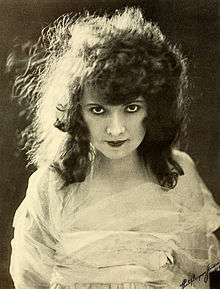 Ward in 1917 | |
| Born | Fannie Buchanan February 22, 1872 St. Louis, Missouri, U.S. |
| Died | January 27, 1952 (aged 79) New York City, U.S. |
| Occupation | Actress |
| Years active | 1890–1898, 1905–1952 |
| Spouse(s) | Joseph Lewis (m.1898–div.1914) John Wooster Dean (m.1915–1950, his death) |
Early life and stage career
Born in St. Louis, Missouri, Ward was the only daughter of Eliza and John Buchanan, who was a dry goods merchant. She had one sibling, a brother, Benton.[3]
In 1890, "against the wishes of her parents", Ward made her stage debut as Cupid in Pippino with vaudevillian star Eddie Foy.[2] She soon became a success in 10 stage productions in New York City before sailing in 1894 to London, where she performed in The Shop Girl. Her performances there led critics to compare Ward favorably to actress Maude Adams. In 1898, however, she married a wealthy diamond merchant and retired from the stage. Ward resumed her career in 1905 after her husband suffered severe business losses that left him, according to news reports, "practically penniless".[4] In April 1907, she returned to the Broadway stage to perform in A Marriage of Reason at the Wallack's Theatre.[5] She was then cast two years later in another Broadway production, The New Lady Bantock; and after its run at Wallack's, she and other cast members took the play on tour to various cities during the latter half of 1909.[6][7] Yet another popular Broadway play in which she performed was the comedy Madam President, which was presented at the Garrick Theatre from September 1913 to January 1914.[8]
Film
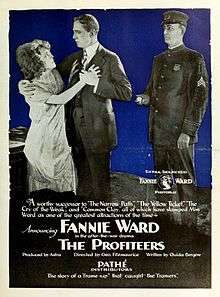
In 1915, around the time Ward's stage career was waning, American movie producer and director Cecil B. DeMille convinced her to perform in The Cheat, a silent film melodrama co-starring Japanese actor Sessue Hayakawa. The film proved to be a sensation due to its plot mingling of racial and sexual themes. In it Ward portrays a society woman who embezzles money and turns to an Asian ivory dealer (Hayakawa) for help, with brutal consequences.[9] The movie launched the careers of DeMille and Hayakawa, who soon became Hollywood's first Asian star.[10]
In addition to starring in The Hardest Way in 1921, Ward also appears in several shorts released in the 1920s: the Phonofilm short Father Time (1924) in which she sings; another Phonofilm production, The Perennial Flapper (1924); and in the Vitaphone short The Miracle Woman (1929).
In 1926, trading on her ever-youthful public image, Ward opened a Paris beauty shop, "The Fountain of Youth".
Personal life and death
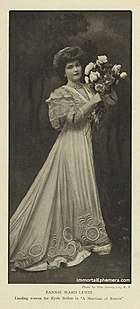
Fannie Ward was married twice. Her first husband was Joseph Lewis, a British money lender and diamond dealer. They married in 1898. In 1909, in an interview with newspaper reporter Marguerite Martyn, Ward stated, "My husband hates my work", and then she questioned why women are treated differently than men professionally:
He wouldn't speak to me for six months after I returned to the stage. But as for my duty, there are men of leisure who have indulgences, who give up half their time to sport or travel or study or research in some favorite art or science, so why shouldn't a woman? I only ask to spend six months out of the year upon the stage.
On January 14, 1913, less than four years after the noted interview, Ward and Lewis divorced. The following year she married her second husband, John Wooster Dean (born John H. Donovan, 1874–1950), an actor who had frequently co-starred with her on stage and in films.
Ward's only child, Dorothé Mabel Lewis (1900–1938), was the result of an affair with the Viscount Castlereagh, who in 1915 became The Most Hon. The 7th Marquess of Londonderry (1878-1949), an Anglo-Irish aristocrat from Ulster.
On January 21, 1952, at age 79, Ward suffered a stroke in her Park Avenue apartment and was found unconscious by a neighbor. She remained in a coma until her death six days later at Lenox Hill Hospital.[2] The New York Times reported that Ward died without a will and left an estate with an estimated value of $40,000.[11] The newspaper also reported that she was survived by "three English grandsons": Lord Patrick Plunkett, the Hon. Shaun Plunkett, and the Hon. Robin Plunkett.[11]
Filmography
- The Miracle Woman (1929) - Ward stars in a Vitaphone short film (survives)
- The Perennial Flapper (1924) - Ward performs comedy sketch as the "perennial flapper" in a DeForest Phonofilm short film
- Father Time (1924) in a Phonofilm short film
- La Rafale (1920)
- Le Secret du Lone Star (1920)
- Our Better Selves (1919) .... Loyette Merval (lost)
- The Profiteers (1919) .... Beverly Randall (lost)
- The Cry of the Weak (1919) .... Mary Dexter (lost)
- Common Clay (1919) .... Ellen Neal (lost)
- The Only Way (1919) (unknown status)
- The Narrow Path (1918) .... Marion Clark (lost)
- A Japanese Nightingale (1918) .... Yuki (survives)
- The Yellow Ticket (1918) .... Anna Mirrel (lost)
- Innocent (1918) .... Innocent (lost)
- On the Level (1917) .... Merlin Warner, aka Mexicali May (lost)
- The Crystal Gazer (1917) .... Rose Jorgensen/Rose Keith/Norma Dugan (lost)
- Her Strange Wedding (1917) .... Coralie Grayson (lost)
- Unconquered (1917) .... Mrs. Jackson (lost)
- A School for Husbands (1917) .... Lady Betty Manners (lost)
- The Winning of Sally Temple (1917) .... Sally Temple (survives)
- Betty to the Rescue (1917) (lost)
- The Years of the Locust (1916) .... Lorraine Roth (survives)
- Witchcraft (1916) .... Suzette (lost)
- Each Pearl a Tear (1916) .... Diane Winston, aka Each Hour a Pearl (USA: alternative title), Every Pearl a Tear (survives)
- A Gutter Magdalene (1916) .... Maida Carrington (lost)
- For the Defense (1916) .... Fidele Roget (survives)
- Tennessee's Pardner (1916) .... Tennessee (survives)
- The Cheat (1915) .... Edith Hardy (survives)
- The Marriage of Kitty (1915) .... Katherine "Kitty" Silverton (lost)
Gallery
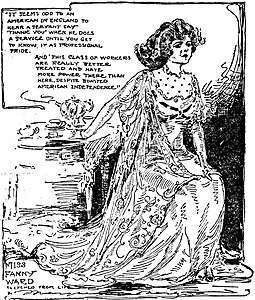 Ward sketch by journalist Marguerite Martyn, 1909
Ward sketch by journalist Marguerite Martyn, 1909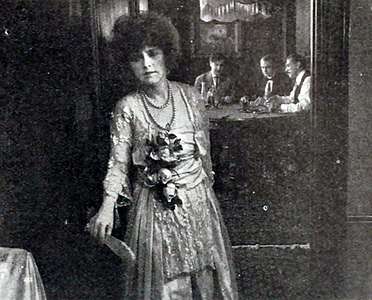 A Gutter Magdalene (1916)
A Gutter Magdalene (1916)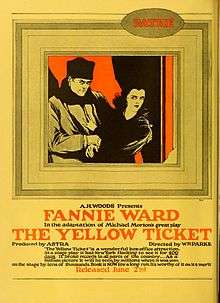 The Yellow Ticket (1918)
The Yellow Ticket (1918)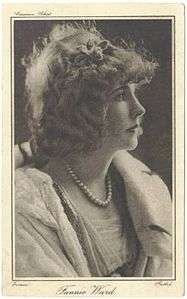 Ward, 1920
Ward, 1920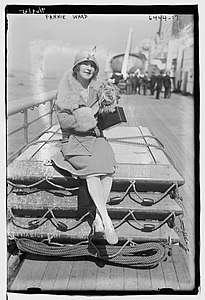 Ward, c. 1925
Ward, c. 1925
References
- New York Star, 6 February 1909, volume 1, number 19, p. 5
- "Fannie Ward Dies; Perennial Flapper", The New York Times, digital archives (1923-present), 28 January 1952, L17. ProQuest Historical Newspapers.
- Ward's obituary in The New York Times cites her father's name as John Buchman, and the 1880 United States Census lists her as Fannie Buchanan, age 7, residing in the household of Eliza and John Buchanan. Her brother, Benton Buchanan, is also listed in that same census.
- "Joseph Lewis Left $20,000", The New York Times, 9 December 1928.
- "Fannie Ward", A Marriage of Reason, April 1907, Wallack's Theatre, New York, N.Y. Internet Broadway Database (IBDB), The Broadway League. Retrieved September 30, 2019.
- The New Lady Bantock, February-March 1909, New York, N.Y. IBDB. Retrieved October 1, 2019.
- Martyn, Marguerite (1909). "Fannie Ward, Who Left St. Louis Poor, Returns Rich, to Buy Her Girlhood Home in Dayton Street", St. Louis Post-Dispatch, 28 March 1909 (Subscription to Newspapers.com required for access).
- "Madam President", Garrick Theatre, September 15, 1913 to January 1, 1914. Playbill, New York, N.Y. Retrieved October 1, 2019.
- Shattuck, Kathryn (2008). "What's On Today", The New York Times, 14 November 2008.
- "Sessue Hayakawa Is Dead at 83", The New York Times, 25 November 1973.
- "Fannie Ward's Estate", The New York Times, 5 February 1952, p. 23. ProQuest Historical Newspapers.
External links
| Wikimedia Commons has media related to Fannie Ward. |
- Fannie Ward at Silents Are Golden
- Fannie Ward at Internet Movie Database
- Fannie Ward at Silent Ladies & Gents
- Fannie Ward scrapbooks, 1875-1954, held by the Billy Rose Theatre Division, New York Public Library for the Performing Arts
- Fannie Ward her stage years portrait gallery at NY Public Library Billy Rose collection
- Rare portrait of Fannie Ward